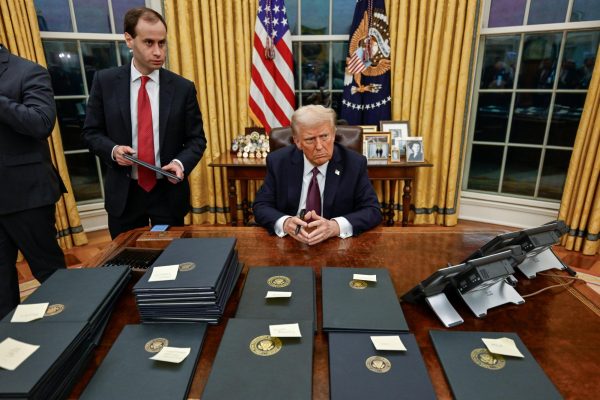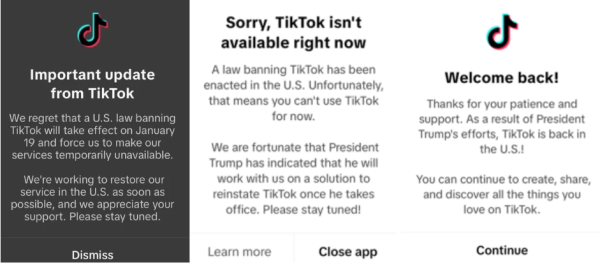In the past few years, the controversy surrounding TikTok has grown greatly. From banning the app from being downloaded on government devices, to a bill being passed that would ban the app in the US, which briefly went into effect in January of 2025.

The roots of the TikTok ban began in 2020, when Donald Trump signed an executive order number 13942, proclaiming his intent to ban TikTok in the US out of fear of the company collecting the information of American users. According to the order, “This data collection threatens to allow the Chinese Communist Party access to Americans’ personal and proprietary information—potentially allowing China to track the locations of Federal employees and contractors, build dossiers of personal information for blackmail, and conduct corporate espionage.”
A judge stopped this order and then it was reversed by the Biden administration in 2021, however in 2022, the No TikTok on Government Devices Act was passed, and in 2024 the Protecting Americans from Foreign Adversary Controlled Applications Act was additionally passed by Congress. TikTok attempted to sue, but the law was upheld by the Supreme Court. ByteDance, the company that owns TikTok, was given a choice: either sell TikTok to an American buyer or cease its operation in the US.
The ruling that allowed the Supreme Court to ban TikTok was on the 17th of January, 2025. The bill that allows TikTok to be banned doesn’t only apply to the aforementioned platform, but to any app that is owned by a country that the US government deems to be a ‘foreign adversary’. Thus, on the evening of the 18th of January, TikTok was shut down in the US.
The original message that appeared on users’ screens to inform them that the ban was in action contained no mention of Trump, however, within the next few hours, the message was changed to say that TikTok was “fortunate that President Trump has indicated he would work on a solution”. One of the key factors in this message is that Trump was, at the time that this message was released to the public, not the current president of the United States. The message that went out to inform users that TikTok had been reinstated in the US also contained mention of Trump.

In the weeks leading up to the 19th, the day the ban would theoretically take action, a decently-sized proportion of TikTok users fled to the Chinese-owned platform Xiaohongshu. Many people, including those actively on TikTok, have never heard of the platform before, while some might only recognize the word as the sign-off of the infamous internet presence @yapdollar. Users went to this platform as an alternative to TikTok and used the hashtag #tiktokrefugee for their new videos and to discover other users who have come from TikTok. The app, also known as RedNote, which is similar to TikTok in its short-form, vertical content style, is hugely popular in China, with around 350 million users. In January alone, the number of daily Xiaohongshu users in the US has spiked from around 300,000 to about 3.5 million, now making up a not-so-small portion of the app’s user base. The switch to Xiaohongshu was all in preparation for the Supreme Court ruling determining the fate of TikTok, which went dark in the US on the evening of January 18th.
Many people have also raised concerns about the amount of time youth, particularly Generation Z, are spending on their phones. The prospect of the app being outlawed has even sparked some to become more conscious about their screen time and social media consumption. Whitaker Morano (9) shared some of their thoughts with us, “[the TikTok ban] will definitely take away a lot of, for the lack of a better term, ‘brain rot’ that social media has given to the youth of now. Or not take it away fully, but definitely decrease [it].”
Syd Asher (12) shared his thoughts on media censorship and the 1st amendment concerning the TikTok ban. “I definitely think that it takes into question the like, ideas of freedom in America, especially when we compare ourselves to other countries. When we talk about censorship, it’s kind of like we don’t even notice our own censorship happening when it happens in America… I think what a lot of people forget about [is that] your data is being mined just the same way as on Tiktok… It’s still going to the same place at the end of the day, which is like advertisers. I don’t think we should be so scared of China… It’s not that it that it’s not warranted, but it’s just that we should look inwards and criticize our own country as much as we do with has China.”
Ultimately, the future of the app is still to be decided. Trump signed an executive order that stops the enforcement of the ban for 75 days from the time of signing, giving ByteDance more time to find an American buyer. Although rumors of potential buyers range from Microsoft, to Jimmy Donaldson (aka Mr. Beast), to Elon Musk, TikTok is estimated to be worth somewhere near $50 billion, which rivals Musk’s purchase of X, formerly known as Twitter, for $44 billion. If there is no further interference by the Trump administration, it is possible that TikTok may go dark again, and the future of other apps such as Xiaohongshu will likewise be undetermined.